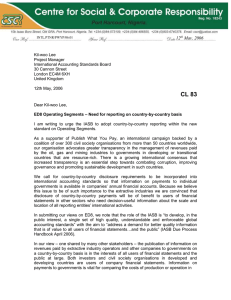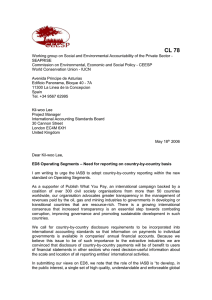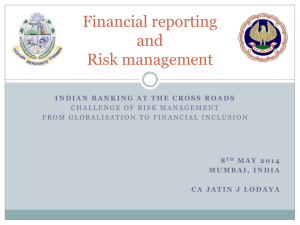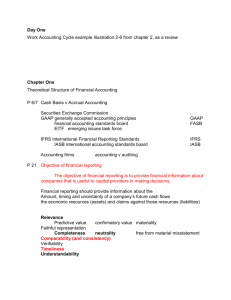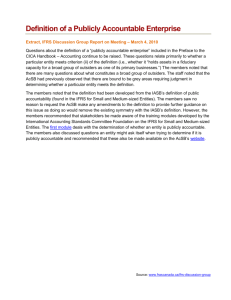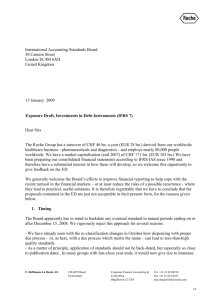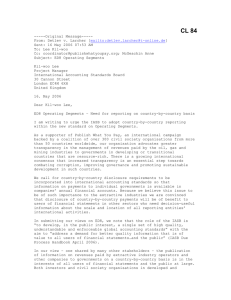actionaid submission to iasb.doc
advertisement
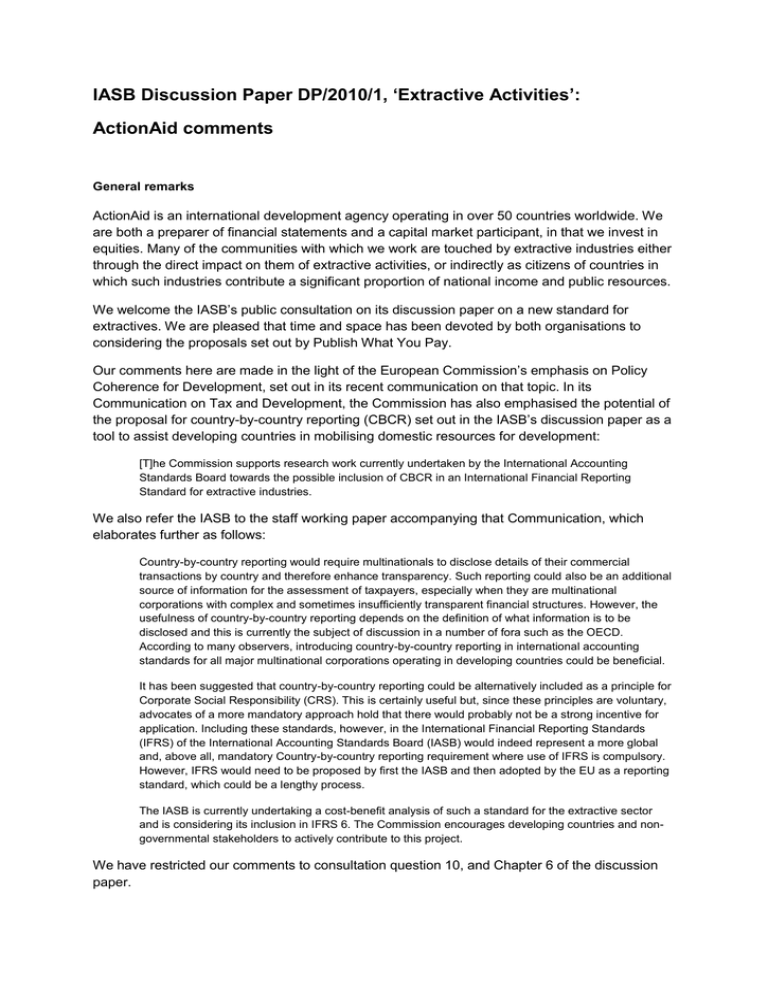
IASB Discussion Paper DP/2010/1, ‘Extractive Activities’: ActionAid comments General remarks ActionAid is an international development agency operating in over 50 countries worldwide. We are both a preparer of financial statements and a capital market participant, in that we invest in equities. Many of the communities with which we work are touched by extractive industries either through the direct impact on them of extractive activities, or indirectly as citizens of countries in which such industries contribute a significant proportion of national income and public resources. We welcome the IASB’s public consultation on its discussion paper on a new standard for extractives. We are pleased that time and space has been devoted by both organisations to considering the proposals set out by Publish What You Pay. Our comments here are made in the light of the European Commission’s emphasis on Policy Coherence for Development, set out in its recent communication on that topic. In its Communication on Tax and Development, the Commission has also emphasised the potential of the proposal for country-by-country reporting (CBCR) set out in the IASB’s discussion paper as a tool to assist developing countries in mobilising domestic resources for development: [T]he Commission supports research work currently undertaken by the International Accounting Standards Board towards the possible inclusion of CBCR in an International Financial Reporting Standard for extractive industries. We also refer the IASB to the staff working paper accompanying that Communication, which elaborates further as follows: Country-by-country reporting would require multinationals to disclose details of their commercial transactions by country and therefore enhance transparency. Such reporting could also be an additional source of information for the assessment of taxpayers, especially when they are multinational corporations with complex and sometimes insufficiently transparent financial structures. However, the usefulness of country-by-country reporting depends on the definition of what information is to be disclosed and this is currently the subject of discussion in a number of fora such as the OECD. According to many observers, introducing country-by-country reporting in international accounting standards for all major multinational corporations operating in developing countries could be beneficial. It has been suggested that country-by-country reporting could be alternatively included as a principle for Corporate Social Responsibility (CRS). This is certainly useful but, since these principles are voluntary, advocates of a more mandatory approach hold that there would probably not be a strong incentive for application. Including these standards, however, in the International Financial Reporting Standards (IFRS) of the International Accounting Standards Board (IASB) would indeed represent a more global and, above all, mandatory Country-by-country reporting requirement where use of IFRS is compulsory. However, IFRS would need to be proposed by first the IASB and then adopted by the EU as a reporting standard, which could be a lengthy process. The IASB is currently undertaking a cost-benefit analysis of such a standard for the extractive sector and is considering its inclusion in IFRS 6. The Commission encourages developing countries and nongovernmental stakeholders to actively contribute to this project. We have restricted our comments to consultation question 10, and Chapter 6 of the discussion paper. Users of accounts Chapter 6 focuses its discussion of costs and benefits on the benefits to capital providers, stating that, the PWYP proposals have been assessed only from the perspective of whether capital providers would find the information to be decision useful. We do not believe this is consistent with the IFRS Foundation’s constitution, which defines the purpose of the IFRS as follows (emphasis added): These standards should require high quality, transparent and comparable information in financial statements and other financial reporting to help investors, other participants in the world’s capital markets and other users of financial information make economic decisions. ActionAid believes therefore that in order to be coherent with the stated purpose of the IFRS, the PWYP proposals should be considered from the perspective of their usefulness to other users, which include civil society organisations, regulators, the media and tax authorities. We note the statement in the recent G20 Heads of State communiqué, that, We encouraged the International Accounting Standards Board to further improve the involvement of stakeholders, including outreach to emerging market economies, within the framework of the independent accounting standard setting process There is a clear benefit to many stakeholders, underlined by the interest in the PYWP and related proposals from the European Commission, Council and Parliament, and the OECD and G20. This notwithstanding, we think it the case that the proposals are also justified in terms of their usefulness to capital market participants. Country-by-country disclosure From a cost benefit perspective, we note that disclosures of the type proposed by Publish What You Pay are now mandatory for extractives companies registered on the US and Hong Kong stock exchanges. Given these regulatory developments, it is questionable whether a costbenefit assessment of such disclosures is appropriate. The priority is to develop a global, consistent approach to this reporting by bringing it within the IFRS. Given that many extractive industries companies will now be preparing country-by-country reporting in this area, such consistency will be of significant benefit to all users. Furthermore, for benefit streams information to be meaningful, further disclosures are needed to allow it to be interpreted. These are the other disclosures in the PWYP proposals. If a costbenefit analysis is to be performed, we believe it essential that the full package of disclosures is considered together, rather than individual disclosures in isolation. Materiality We are concerned by the proposal in the discussion paper that the materiality threshold for disclosure be set in terms of what is material for the company based on the size of national reserves relative to their international operations. The paper is not entirely consistent on this point, stating first that: [T]he potential economic loss (or gain) to the entity arising from country-specific investment risks would be expected to be correlated to the relative value of the entity’s investments in that country. And subsequently that: [A]n entity’s exposure to reputational risks and the associated potential economic loss is not correlated to the scale of the entity’s investment in a particular country. Therefore, to meet the needs of both capital providers and other users, the minimum level of disaggregation required for all country-specific disclosures should be set at the individual country level Discretionary exemption The Discussion Paper proposes a discretionary exemption from any country-specific reporting as follows: One approach could be to require the disclosure subject to an exemption similar to that in IAS 37 Provisions, Contingent Liabilities and Contingent Assets, which as explained in Chapter 5 provides an exemption in cases when disclosing the required information could be expected to prejudice seriously the position of the entity. In genuine cases where the disclosure of payments to governments is considered either to breach confidentiality requirements that a host government is expected to enforce or is expected to prejudice seriously the position of the entity for other reasons, the project team recommends that the entity should disclose why it is unable to disclose the information. In ActionAid’s view such an exemption would undermine the consistent, global nature of IFRS, which is necessary both to build accountability at national level and to protect companies from pressure exerted on them at national level to withhold information. The proposals for discretionary exceptions to this, both in terms of the materiality threshold and the possibility for exemptions from disclosure of information pertaining to individual countries, should be removed. July 2010
